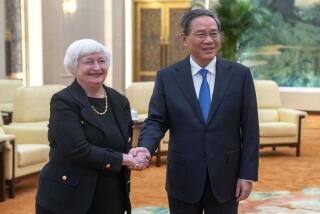China to allow the sale of foreign securities
SHANGHAI — Chinese and U.S. officials ended high-level economic talks Thursday by announcing a number of accords, including one allowing foreign companies to issue stocks and bonds in China for the first time.
U.S. officials made little headway on key efforts to push the Chinese to open up the financial services sector and quicken the pace of appreciation of China’s currency -- something that could prompt criticism from businesses and members of Congress who blame an undervalued yuan for part of China’s ballooning trade surplus with the U.S.
Treasury Secretary Henry M. Paulson Jr. acknowledged that there was only modest progress made in financial services. Washington has been pressing China, for example, to lift caps on foreign ownership of Chinese banks and other financial institutions. Beijing agreed only to consider the matter.
Nonetheless, Paulson said “great strides” had been made since the U.S.-China strategic economic dialogue was launched a year ago between the largest economy in the world and the fastest-growing one. Paulson’s counterpart, Vice Premier Wu Yi, called the latest, third round of talks a “complete success.”
China and the U.S. also agreed to efforts on energy and the environment, pledging to work jointly to develop biofuels, reduce sulfur dioxide emissions and combat illegal logging.
One accord that is likely to have a significant effect involves approval for Chinese citizens to travel to the U.S. as tourists instead of just on business travel visas. The U.S. predicts that will increase Chinese visitors to 579,000 annually by 2011, up from 320,000 last year.
“This is going to be big for California,” said state Sen. Lou Correa (D-La Habra), who was in Shanghai on Thursday on a fact-finding mission with two other California senators. His district includes Anaheim and Little Saigon.
China agreed to allow foreign companies doing business there, including banks, to issue yuan-denominated stocks and bonds. Paulson said there was clearly demand from U.S. companies to finance their investments in local currency.
Analysts agreed that U.S. firms may find appeal in tapping China’s stock market, given the weakening dollar and increasing personal liability regulations that have made public stock offerings in the U.S. less attractive. But many foreigners remain wary of China’s volatile and less-transparent equities market.
The attraction could be even stronger on the bond side, especially if foreign corporations are able to issue unsecured higher-yield debt. The new agreement “does open up a lot of potential possibilities,” said Dale Colling, managing partner of ALC Advisors, an advisory and investment firm based in Shanghai.
As in previous rounds, Paulson this week again urged Beijing to move quickly on the issue of China’s currency, which some politicians and businesses say is grossly undervalued, giving Chinese exporters an unfair edge. He appealed to China’s self-interest in adopting a more flexible currency policy, arguing that it would help stabilize China’s economy and address its current bout of inflation. But Chinese officials gave no indication that they were willing to back away from their policy of modest adjustments to the currency.
---
More to Read
Inside the business of entertainment
The Wide Shot brings you news, analysis and insights on everything from streaming wars to production — and what it all means for the future.
You may occasionally receive promotional content from the Los Angeles Times.











